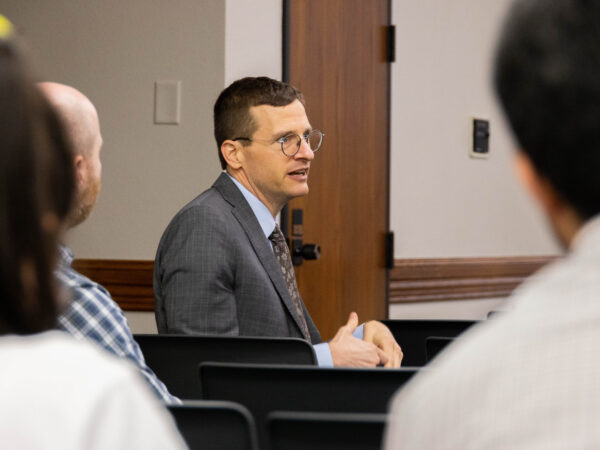Renowned Professor Lectures Sport Management Division
Renowned professor Dr. Emma Sherry hosted a lecture Wednesday afternoon for sport management staff and students. Dr. Sherry is a leading scholar in sport management at La Trobe University in Melbourne, Australia, and spoke about her research on marginalized populations and dealing with the social and cultural roles of sports in other countries.
During her lecture, Dr. Sherry discussed with attendees the different methods for gathering qualitative and quantitative data. She referenced one of her recent research projects where she traveled to Papua New Guinea to work with children in small communities and partnered with the National Rugby League (NRL), the national governing body for rugby league in Australia to evaluate a program that combats societal violence and education engagement through sport-for-development programs.
“What we learned is that sport is used as a vehicle to communicate, implement and achieve non-sport development goals,” Dr. Sherry said about the program. “However, it needs to be the right program, designed for the right people, delivered at the right time.”
“What we learned is that sport is used as a vehicle to communicate, implement and achieve non-sport development goals,” Dr. Sherry said about the program. “However, it needs to be the right program, designed for the right people, delivered at the right time.”
Dr. Sherry and her colleagues worked with the communities in Papua New Guinea and the NRL during a multi-year research project. She explained how football (rugby) was used as the tool used to make an effective change.
“The most successful programs appear to be those where we attract target populations to provide other social welfare services with sport being used as the hook,” she said. “In a country like Papua New Guinea, they take their football very seriously. We wanted them to benefit from the education program and still have fun in the process.”
Her research sought to shift the cultural stance of violence in communities that effected at-risk children and adults through the use of a rugby-led academic program. Over the course of the study, primary school students participated in activities that promoted individual and communal growth in a structured environment. In addition to daily schoolwork and football practice, students were taught certain skills including proper hygiene.
“The culture there is very different. Violence is much more common especially violence towards women,” she said. “What we’ve identified is that there are risk factors that can’t be changed. Our job was to recognize what theoretical mechanisms we can change.”
In doing so, Dr. Sherry documented numerous changes in the lives of her community members, such as increased attendance and engagement with school, and more respectful communication in the classroom. She said the change was slow, but noticeable. She also noted that keeping children active left little room for boredom. This encouraged them to not only stay out of trouble, but to work more with others.
A significant change occurred in men within the communities. There appeared to be a growing movement that encouraged others to prohibit violence towards women.
“A lot of our work is on individual empowerment and creating forms of sustainability,” she said. “If I can be a part of something that helps that community and helps them to stop beating on women, then I am okay with that.”
For more information on Dr. Sherry and her work in sport-management, click here.
Written by Justin Ikpo (cehdcomm@tamu.edu)
For media inquiries, contact Ashley Green.














